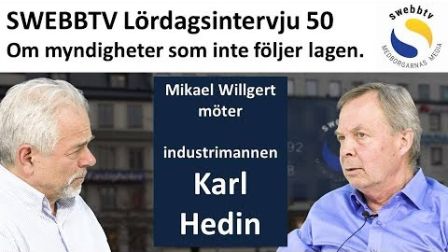
In this episode, energy expert Elsa Widding explains that the Paris Agreement is the world's most expensive agreement. Despite this, it does not bring any positive effect. We are also talking about the government's far-reaching energy business, which by a low estimate cost taxpayers far more than SEK 50 billion.
Elsa Widding has extensive experience from investigations and work within energy companies and at the Government Offices.
She has now written a book, where she, with the help of various experts, has compiled information on the climate and the risk of carbon dioxide leading to a climate catastrophe. Her conclusion is that she is not very worried.
The UN Climate Panel IPCC compiles information from climate scientists. Elsa points out that these researchers are tasked with showing the human impact on the climate. It is only this type of work which attracts grants.
Her views that the IPCC itself produces a lot of relevant information. But a problem is that the research results in a political document for decision makers who are completely governed by political goals. The IPCC does not speak about climate catastrophes or extreme weather, this is something which is produced in the summary.
Elsa says that the climate models that have been used have not been validated, meaning that they have not been proven to work. When testing them on historical data, they do not show the real development. One important reason is that they are based on that there must be a "amplification factor" which has not been shown at all.
Hew view is that the journalists do not do their job. They do not even seem to read the reports.
According to Elsa Widding, the basics of the climate alarm has not been verified, where the most important factor is the so-called amplification factor, which has not been demonstrated.
The long-term trend based on ice cores shows that the temperature in the past thousands of years is falling. The temperature increase we are seeing now is a recovery after the "little ice age" that occurred a few hundred years ago and this has nothing to do with carbon dioxide.
She says that the Paris Agreement is the world's most expensive agreement. Even so, it can be shown that even if all countries follow the agreement, there is no special effect on the temperature. The climate has become a pretext for politicians to avoid having to deal with real problems.
Then we come into electricity production based on wind power. Wind power results in that the entire electricity grid must be strengthened and rebuilt for large amounts. In addition, we already have power shortages which prevent company allocations. In the future, this may result in that parts of the network will face being disconnected because of power shortages, which will be a problem for Sweden's competitiveness.
When Elsa Widding worked at the Government Offices, she tried to get Maud Olofsson to reject Vattenfall's catastrophic purchase of Nuon, which has resulted in a loss of more than SEK 50 billion Swedish krona for taxpayers.
She explains that no preparation work was made before the purchase and that the deal could not be stopped.
She also went into a debate article in SvD and EFN and tried to stop the deal with the coal in Germany. She explains that Sweden sold the coal for SEK 124 million in 2016. The new owner already made a profit of two billion in the first 14 months and wrote up the value by five billion immediately after the purchase. Although went out via the media and protested before the coal was dropped, no one has commented on this.
Elsa Widding's book can be ordered at www.klimatkarusellen.se (Swedish language only at present.)

59:11

56:53

24:11

16:54